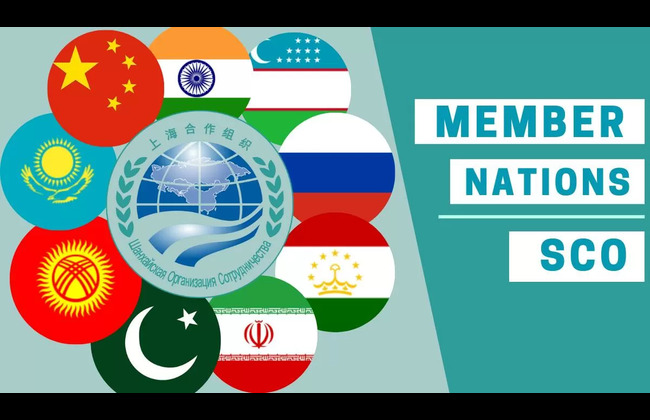SCO AND HEALTH DIPLOMACY BEYOND BORDERS
The Shanghai Cooperation Organization (SCO) has established itself as one of the most important regional organizations, with a wide-reaching influence that spans multiple sectors, including security, trade, energy, and cultural cooperation. Formed in 2001, the SCO expanded its membership to include some of the world’s largest and most influential countries: China, Russia, India, and Pakistan, along with the Central Asian nations of Kazakhstan, Kyrgyzstan, Tajikistan, and Uzbekistan. Collectively, these countries account for nearly 40% of the global population and around 30% of the world’s economy, making the SCO a significant player in the global order. Although the organization's primary focus has historically been on security and counter-terrorism, it has increasingly broadened its scope to encompass issues that transcend borders, including economic integration, technological innovation, and, more recently, health diplomacy.
Health diplomacy within the SCO is becoming a crucial area of cooperation as global health challenges intensify. The COVID-19 pandemic underscored the importance of cross-border collaboration in health, from the development and distribution of vaccines to ensuring the resilience of healthcare systems. SCO member states are not immune to these challenges, with many facing the dual burden of existing healthcare infrastructure gaps and the pressing need to modernize healthcare delivery through innovation in medical technology. The pandemic demonstrated that no country is isolated in health matters; what happens in one part of the world can affect the rest. This interconnectedness makes health diplomacy a vital area of focus for the SCO.
One of the key areas where the SCO can make a substantial impact is in the development and sharing of medical technologies. China and Russia, in particular, have made significant strides in biotechnology, vaccine development, and healthcare innovation. By leveraging these advancements, the SCO can foster collaboration among member states, ensuring that innovations in medical technology are accessible to all. This would not only strengthen the healthcare systems of individual member states but also create a more resilient regional health network capable of responding to future pandemics and health crises. Vaccine research and production, which have become highly competitive sectors globally, present opportunities for member states to pool their resources, expertise, and capabilities.
The upcoming 23rd Meeting of the Council of Heads of Government of the SCO in Islamabad is set to be a pivotal moment for advancing health diplomacy within the organization. This meeting, which will take place from October 14 to 17, 2024, will be attended by heads of government from across the region, including the Chinese Premier Li Qiang, who is visiting Pakistan at the invitation of Prime Minister Shehbaz Sharif. The significance of this high-level visit cannot be understated. It reflects the strengthening ties between SCO members, particularly Pakistan and China, and opens the door for deeper cooperation in areas like healthcare, which have traditionally been overlooked in favor of more immediate security concerns.
For Pakistan, hosting this meeting is an opportunity of immense strategic and economic importance. As a member of the SCO, Pakistan has actively participated in regional security and trade initiatives, but its healthcare system has yet to fully benefit from the potential offered by this regional partnership. With the upcoming meeting in Islamabad, Pakistan is uniquely positioned to advocate for greater collaboration in health diplomacy. The country’s healthcare system must contend with issues ranging from inadequate facilities in rural areas to a shortage of healthcare professionals. Moreover, Pakistan has the potential to become a regional hub for healthcare cooperation, given its strategic location and growing influence within the SCO. Pakistan has the chance to push for concrete initiatives in healthcare. For instance, Pakistan could advocate for the creation of a regional health task force within the SCO, aimed at coordinating responses to health emergencies, sharing best practices in public health, and ensuring the equitable distribution of medical supplies and vaccines. Such an initiative could be modeled after successful global health alliances but tailored to the unique needs and capacities of SCO member states.
The potential for collaboration extends beyond just government-to-government relations. Private sector partnerships within the SCO can also play a critical role in advancing healthcare objectives. Pakistan’s burgeoning technology sector, combined with the expertise of other SCO members in medical research and development, presents an opportunity for joint ventures in medical technology. These collaborations could lead to the development of new healthcare innovations that not only benefit SCO countries but also have the potential for global impact. Additionally, the growing focus on vaccine research within the SCO offers Pakistan a platform to collaborate on vaccine development and distribution, ensuring that the region is better prepared for future pandemics.
The presence of heads of government, particularly China’s Premier Li Qiang, at the meeting in Islamabad further highlights the importance of these discussions. China has been a leader in health diplomacy, particularly during the COVID-19 pandemic, when it played a key role in vaccine development and distribution across the globe, including to SCO countries. By strengthening ties with China and other member states, Pakistan stands to gain from these advances in healthcare. The SCO’s focus on health diplomacy presents a unique opportunity for Pakistan to tap into regional resources and expertise to improve its healthcare system, enhance its capacity for dealing with health crises, and position itself as a leader in regional health cooperation.
For Pakistan, the upcoming meeting represents more than just an opportunity to host world leaders—it is a chance to shape the future of health diplomacy within the SCO and beyond. Through partnerships, innovation, and collaboration, the SCO can lead the way in addressing global health challenges, with Pakistan playing a central role in this evolving dynamic. The 23rd Meeting of the Council of Heads of Government in Islamabad could mark a turning point in how the SCO approaches healthcare, with potential long-term benefits not only for Pakistan but for the entire region.
Dr. Muhammad Shahbaz
President of China Pakistan Medical Association.
Ambassador of Silk Road Friendship
Email: iosurg@gmail.com


0 Comments:
Leave a Reply